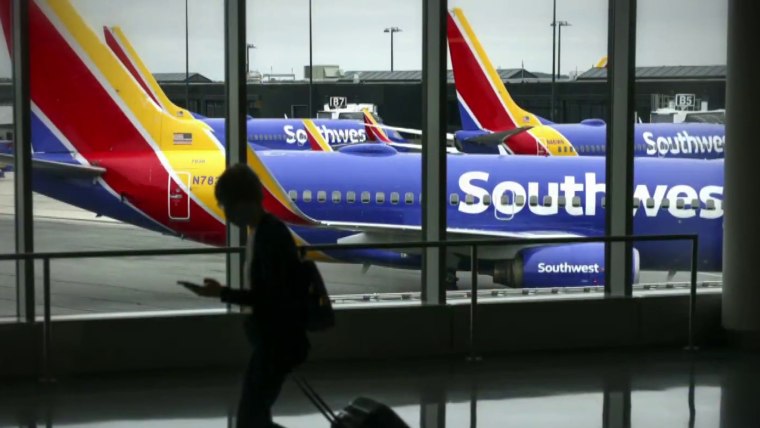
WASHINGTON — A top Southwest Airlines executive apologized for the carrier’s winter meltdown in a Senate hearing over the travel debacle that separated thousands of flyers from their families, wedding ceremonies and even medications in the days after Christmas.
“I want to sincerely and humbly apologize to those impacted by the disruption, which caused a tremendous amount of anguish, inconvenience and missed opportunities for our customers and employees,” Southwest Chief Operating Officer Andrew Watterson told the Commerce, Science and Transportation Committee on Thursday.
The Dallas-based airline has been under intense scrutiny after it canceled more than 16,000 flights during late December’s frigid weather across much of the country, which disrupted services among the major airlines but none as severely as Southwest’s.
Under at times intense questioning from bipartisan lawmakers, Watterson promised a range of measures to make things right with fliers and prevent a future weather-related breakdown. Those included updates to scheduling software that Watterson said were slated to go into effect Friday, along with ongoing assessments and funding to address icing issues at airports prone to freezing conditions.
Some lawmakers pressed Watterson for changes to Southwest’s policies toward customers caught up in the holiday crisis.
Sen. Ed Markey said affected customers should be offered cash hardship payments, rather than the frequent-flier points Southwest has extended to compensate for inconveniences and financial losses many endured. In addition to refunding those travelers’ tickets, the airline has offered points that Watterson said were equivalent to $300 to put toward future bookings.
“The point system that you want to use is only going to be useless,” Markey countered. “It’s nothing but an empty gesture.”
The Massachusetts Democrat also pushed Watterson to commit to paying for customers’ flights should they choose to fly with other airlines.
Watterson demurred on both proposals, saying, “If they choose to fly somebody else, that is certainly their choice.” He later added, “We will not pay them cash to pay to another airline unless it’s for reimbursement of a flight they took in the disruption.”
The meltdown has put a spotlight on Southwest’s flight routing system and the technology it runs on, which differs from those of other major carriers. Southwest’s “point to point” approach means that planes typically fly consecutive routes rather than operating around a series of hubs. That heightens the risk of disruptions snowballing across the system when certain flights and crews can’t reach their destinations, experts have said.
Watterson addressed criticisms of its systems Thursday, saying, “We’re increasing our IT spend faster than our company is growing.” He said Southwest was investing $1.3 billion in tech upgrades this year, adding that the figure marks a 25% increase from 2019, before the onset of pandemic-related costs.
Captain Casey A. Murray, president of the Southwest Airlines Pilots Association, who also testified at the hearing, said the carrier’s leadership didn’t sufficiently prepare for the winter storm or heed frontline workers’ warnings. He also accused executives as having “allowed the airline to drift away from an employee-centered culture” over the years.
In response to allegations that Southwest had excessively prioritized shareholders, Watterson said the company recently reinstated its quarterly dividend only after funding “top industry wages” for employees, aircraft purchases, IT department needs and debt repayments.
The Transportation Department said late last month that it is investigating Southwest, including whether company executives scheduled an unrealistic volume of flights, “which under federal law is considered an unfair and deceptive practice.” The carrier has said it is cooperating with all inquiries.
Thursday’s hearing also showcased competing visions of the role of government in regulating commercial aviation and addressing affordability concerns. Airline ticket prices have climbed over the past year and remained extraordinarily high even during this winter’s travel havoc. Federal data shows airfares in December 2022 were more than 28% as high on average versus that month in 2021.
“Some Democrats on this committee were proposing the government step in with overly complex, anticompetitive and frankly unnecessary regulations that would collectively have the result of making flying unaffordable for many Americans,” said Sen. Ted Cruz, R-Texas.
Other people who testified Thursday argued for more consumer choice by other means. Paul Hudson, president of the Flyers Rights passenger advocacy group, called the industry an “oligopoly” consisting of four major airlines and criticized what he described as the government’s laissez-faire approach to deregulation.
Clifford Winston, a senior fellow at the Brookings Institution, said that privatizing U.S. airports in major metropolitan areas could help open the door for more international carriers to serve domestic passengers as well as ease congestion.
“If you want to reduce the likelihood of mistakes, and you want people to be able to correct their mistakes, they need to be held accountable,” said Winston. “More competition will enable that to happen.”
 Latest Breaking News Online News Portal
Latest Breaking News Online News Portal





